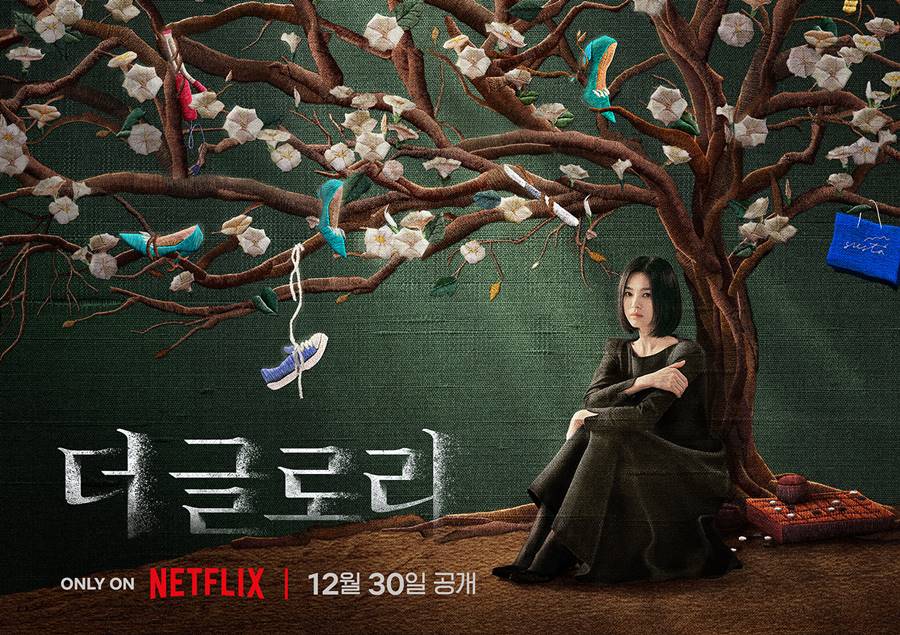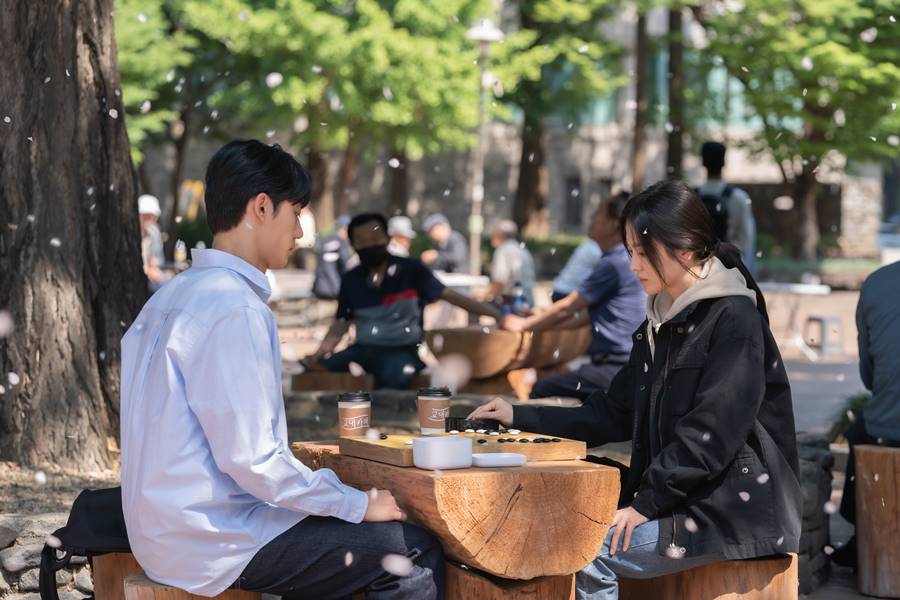
By Jae-Ha Kim
jaehakim.com
January 1, 2023
![]() Moon Dong-eun (played by Song Hye-kyo)
Moon Dong-eun (played by Song Hye-kyo)
Ju Yeo-jeong (played by Lee Do-hyun)
↑Note: Korean names denote the surname followed by the given name.
“The Glory” had so much promise — a strong leading lady (Song Hye-kyo), a skilled screenwriter (Kim Eun-sook), the backing of Netflix’s money, and the promise of a scintillating revenge thriller. And yet at the end of the eight-episode first season — stop doing this, Netflix! — I found myself underwhelmed.
While the protagonist talked a lot about her need for vengeance, a good portion of the story arcs ultimately fall flat.
This K-drama begins with excessively extreme school violence. To refer to it as bullying is undermining what these psychopath teens do to Dong-eun. As a high school student, she was brutally assaulted regularly at school by the privileged students and their sycophantic minions. They burned her arms, legs and back with a curling iron. They sexually assaulted her. They kicked and beat her.
When she reported her sadistic classmates to the police, the authorities sided with the students’ rich parents, who said friends always get into little tiffs with each other. When she dropped out of school, her homeroom teacher beat her for reflecting poorly on him. And none of the dozens of other school personnel who witnessed this did a damned thing to stop the abusive teacher. They just … let it happen. Her only adult ally was the school nurse, who was fired before she could help Dong-eun in any meaningful way.
The show’s best moments are when Jung Ji-so portrays the teenage version of Dong-eun. Jung convincingly conveys the fears of a victim who knows that no adult will help her. And no student will side with her, because they don’t want to become the next victims. The school and police have already failed her. And her absent mother willingly signs over her consent to not pursue any charges when the head bully’s mom gives her a measly $700 in compensation to remain quiet.
Song’s stoic portrayal of Dong-eun in her 20s and 30s is less effective. But when she’s allowed to express Dong-eun’s no-bullshit attitude, she showcases what she could’ve done. When she refuses to play along with a creepy fellow teacher, he tells her she’s lucky she’s not a man, because otherwise he would’ve hit her … and then says he’s joking. She replies, “Really? Because you look like the type of man who’d only hit a woman.” Then she brightly smiles and cutely says, “I’m just joking, just like you did.”
And when medical intern Yeo-jeong falls for her at first sight, it’s not clear why. Is it simply because she’s pretty? Or is he attracted to her because she shows no signs of romantic interest — at least initially — in him? She does want to use his knowledge of Go/Baduk, which she knows will be beneficial when she attempts to weaken the marriage of her chief tormenter Yeon-jin (Lim Ji-yeon), who is now a well-known on-air weather forecaster.

From the time she drops out and earns her GED, Dong-eun’s plan is to punish her high school perpetrators, especially the ringleader Yeon-jin. She works non-stop so she can pay for college. She becomes a teacher. She keeps tabs on what school Yeon-jin’s child enrolls in. And then she ingeniously blackmails her way into becoming the new teacher in the little girl’s class.
It’s a clever premise. Instill fear in Yeon-jin by showing her that you can harm her child almost any time she wants to. Is Dong-eun likely to do that? Probably not. But who’s to say? When she tells Yeon-jin not to use her influence to get her fired, or to transfer her daughter to another school, Yeon-jin listens.
But why though? Maybe she can’t get Dong-eun fired, but what recourse would Dong-eun have if the child did enroll at a different institution? Would Dong-eun follow each time the child went to a new school? And if she did, wouldn’t Yeon-jin and her rich husband have everything they need to file a harassment or stalking charge?
In one of the more absurd sub plots, Dong-eun enlists the aid of Hyeon-nam (Yeom Hye-ran), a neighborhood ajumma who has just one tiny condition: Once Dong-eun has gotten her revenge, she must kill Hyeon-nam’s abusive husband, too.
Um, what? But Dong-eun agrees to it.
It was at this point that I wondered about something the rich high schoolers had said to Hye-jeong, who was Yeon-jin’s high school friend/lackey. She was always viewed as less than by her rich peers because her family’s not wealthy. They told her that if they hadn’t chose Dong-eun to be their victim, they would’ve picked her to torture instead.
Had that scenario played out, would Dong-eun have capitulated in the high school version of the Milgram experiment? Would she have abused Hye-jeong when ordered to do so to evade being beaten herself? Would you have?
In the past couple months, I watched “Weak Hero Class 1” and “Reborn Rich” (which stars Song’s ex-husband Song Joong-ki). The former also dealt with high school bullying, while the latter addressed reincarnation as a means for vengeance. Both were superior K-dramas with vigorous storylines that offered plenty of suspense.
For the second season, I’m hoping that everyone involved in torturing Dong-eun — including the faculty at her old high school — are severely punished. And that Dong-eun is able to get justice without losing herself.
Trivia: Song Hye-kyo and screenwriter Kim Eun-sook first worked together in the 2016 series “Descendants of the Sun.”
Airdates: Eight episodes — each about 50-minutes long — dropped on Netflix on December 30, 2022. You may read about the second season (which is much better!) and why bullying is such a big plot device in Korean shows here.
Spoiler Alert: Near the end of the first season, Yeo-jeung offers a platitude along the lines of, “It’s better to forgive.” Dong-eun takes off some of her clothes to reveal the scars that cover her body. She asks if plastic surgery can remove the physical damage. (He’s conveniently a plastic surgeon.) He is enraged by what he sees and says he’ll do anything to help her — even kill. This seems so out of character.
Though Yeo-jeung has his own trauma — his father had been murdered by one of his patients, who now sends him letters from prison — he is not a murderer. Or maybe he is. We’ll hopefully learn more of his backstory in March when the second season airs.
© 2023 JAE-HA KIM | All Rights Reserved






I had the same question re: Yeon-jin’s daughter and the feasibility of moving to different schools. The only variable I can think of that might be a factor is that Dong-eun has dirt on her father-in-law re: his will.
Perhaps that will be explored in the second season? Because the way it stands now, it makes no sense.